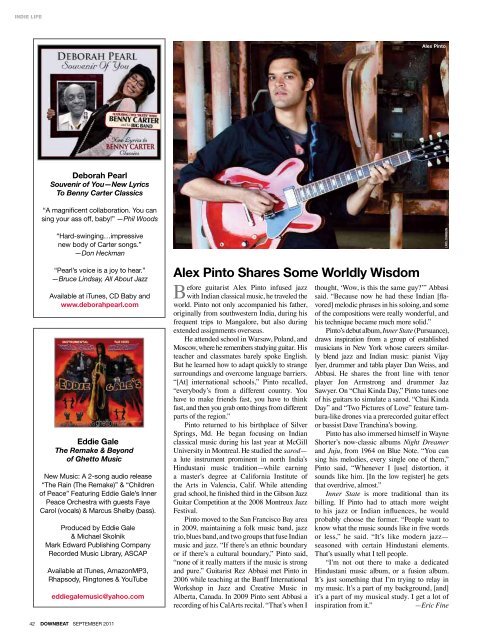You also want an ePaper? Increase the reach of your titles
YUMPU automatically turns print PDFs into web optimized ePapers that Google loves.
INDIe LIfe<br />
Alex Pinto<br />
Deborah Pearl<br />
Souvenir of You—New Lyrics<br />
To Benny Carter Classics<br />
“A magnificent collaboration. You can<br />
sing your ass off, baby!” —Phil Woods<br />
“Hard-swinging…impressive<br />
new body of Carter songs.”<br />
—Don Heckman<br />
Lars Johnson<br />
“Pearl’s voice is a joy to hear.”<br />
—Bruce Lindsay, All About Jazz<br />
Available at iTunes, CD Baby and<br />
www.deborahpearl.com<br />
Eddie Gale<br />
The Remake & Beyond<br />
of Ghetto Music<br />
New Music: A 2-song audio release<br />
“The Rain (The Remake)” & “Children<br />
of Peace” Featuring Eddie Gale’s Inner<br />
Peace Orchestra with guests Faye<br />
Carol (vocals) & Marcus Shelby (bass).<br />
Produced by Eddie Gale<br />
& Michael Skolnik<br />
Mark Edward Publishing Company<br />
Recorded Music Library, ASCAP<br />
Available at iTunes, AmazonMP3,<br />
Rhapsody, Ringtones & YouTube<br />
eddiegalemusic@yahoo.com<br />
Alex Pinto Shares Some Worldly Wisdom<br />
Before guitarist Alex Pinto infused jazz<br />
with Indian classical music, he traveled the<br />
world. Pinto not only accompanied his father,<br />
originally from southwestern India, during his<br />
frequent trips to Mangalore, but also during<br />
extended assignments overseas.<br />
He attended school in Warsaw, Poland, and<br />
Moscow, where he remembers studying guitar. His<br />
teacher and classmates barely spoke English.<br />
But he learned how to adapt quickly to strange<br />
surroundings and overcome language barriers.<br />
“[At] international schools,” Pinto recalled,<br />
“everybody’s from a different country. You<br />
have to make friends fast, you have to think<br />
fast, and then you grab onto things from different<br />
parts of the region.”<br />
Pinto returned to his birthplace of Silver<br />
Springs, Md. He began focusing on Indian<br />
classical music during his last year at McGill<br />
University in Montreal. He studied the sarod—<br />
a lute instrument prominent in north India’s<br />
Hindustani music tradition—while earning<br />
a master’s degree at California Institute of<br />
the Arts in Valencia, Calif. While attending<br />
grad school, he finished third in the Gibson Jazz<br />
Guitar Competition at the 2008 Montreux Jazz<br />
Festival.<br />
Pinto moved to the San Francisco Bay area<br />
in 2009, maintaining a folk music band, jazz<br />
trio, blues band, and two groups that fuse Indian<br />
music and jazz. “If there’s an ethnic boundary<br />
or if there’s a cultural boundary,” Pinto said,<br />
“none of it really matters if the music is strong<br />
and pure.” Guitarist Rez Abbasi met Pinto in<br />
2006 while teaching at the Banff International<br />
Workshop in Jazz and Creative Music in<br />
Alberta, Canada. In 2009 Pinto sent Abbasi a<br />
recording of his CalArts recital. “That’s when I<br />
thought, ‘Wow, is this the same guy’” Abbasi<br />
said. “Because now he had these Indian [flavored]<br />
melodic phrases in his soloing, and some<br />
of the compositions were really wonderful, and<br />
his technique became much more solid.”<br />
Pinto’s debut album, Inner State (Pursuance),<br />
draws inspiration from a group of established<br />
musicians in New York whose careers similarly<br />
blend jazz and Indian music: pianist Vijay<br />
Iyer, drummer and tabla player Dan Weiss, and<br />
Abbasi. He shares the front line with tenor<br />
player Jon Armstrong and drummer Jaz<br />
Sawyer. On “Chai Kinda Day,” Pinto tunes one<br />
of his guitars to simulate a sarod. “Chai Kinda<br />
Day” and “Two Pictures of Love” feature tambura-like<br />
drones via a prerecorded guitar effect<br />
or bassist Dave Tranchina’s bowing.<br />
Pinto has also immersed himself in Wayne<br />
Shorter’s now-classic albums Night Dreamer<br />
and Juju, from 1964 on Blue Note. “You can<br />
sing his melodies, every single one of them,”<br />
Pinto said, “Whenever I [use] distortion, it<br />
sounds like him. [In the low register] he gets<br />
that overdrive, almost.”<br />
Inner State is more traditional than its<br />
billing. If Pinto had to attach more weight<br />
to his jazz or Indian influences, he would<br />
probably choose the former. “People want to<br />
know what the music sounds like in five words<br />
or less,” he said. “It’s like modern jazz—<br />
seasoned with certain Hindustani elements.<br />
That’s usually what I tell people.<br />
“I’m not out there to make a dedicated<br />
Hindustani music album, or a fusion album.<br />
It’s just something that I’m trying to relay in<br />
my music. It’s a part of my background, [and]<br />
it’s a part of my musical study. I get a lot of<br />
inspiration from it.”<br />
—Eric Fine<br />
42 DOWNBEAT SEPTEMBER 2011
















